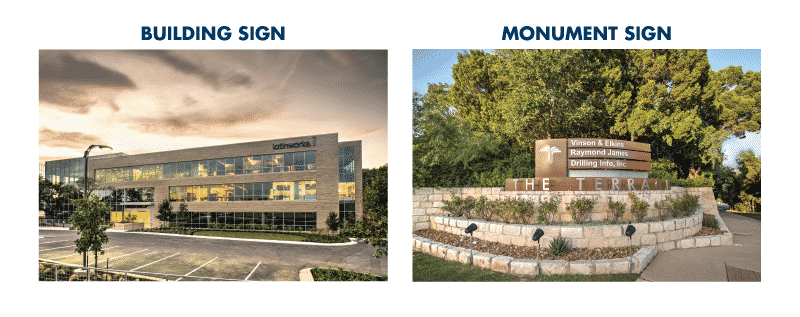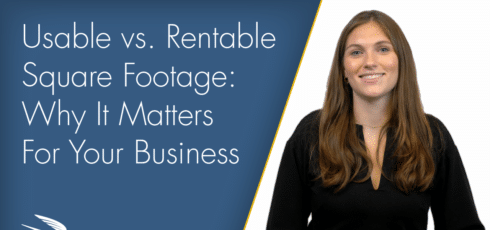There are many benefits to hiring a tenant representation broker to represent you during the site selection and lease negotiation process, but most importantly they will help you gain the leverage you need to secure the most favorable lease economics.
It can be tempting to just look at the value of a deal based on rental rate alone, but there are a number of other factors a good tenant representative will negotiate in your lease to protect you, save you money and allow maximum flexibility over the life of your lease.
In this article, we will explain the eleven most important deal points and concessions a tenant representation broker can help you secure in your lease contract.
The Lease Negotiation Process
1. Parking Rights
Parking is tight in Austin, especially in the city’s Central Business District (CBD).
You should consider available parking ratios alongside asking rental rates, amenities, and location during the site selection process, especially if you plan to have a highly efficient (dense) office layout.
Typically, parking ratios are quoted in terms of square feet. For example, say you’re looking at an option with a 3:1000 parking ratio, which translates to 3 parking spaces per 1,000 square feet leased. If you’re planning a denser office layout, say 6 employees per 1,000 square feet, then you’re going to have more people (and cars) than places for them to park.
This is where your tenant rep broker can help. They will take your parking needs into consideration from day one of the site selection process and help you identify properties that will be able to accommodate your employees’ parking needs.
During lease negotiations, your tenant rep will make sure you secure enough parking spaces for not only your current needs but your future needs as well.
In addition, your broker should negotiate the payment of parking so that you only pay for the parking as it is used. If you’re not using all of your allocated parking immediately, you should not have to pay for the full number of spaces. You will only start to pay for more of your allotted parking as you expand.
Sometimes, however, a building simply doesn’t have the spots available to meet your required parking ratio. This is especially common in downtown office buildings and older suburban buildings that were built with more traditional office densities in mind.
In this case, your tenant rep broker can help you craft a creative parking solution to make up for the additional parking you need.
This could mean negotiating with a neighboring residential complex or specialty use such as a church or restaurant to use its parking during daytime hours or helping you form a corporate partnership with a rideshare company.
2. Expansion Clauses
If you know your company has plans to grow, it is important for your tenant rep broker to help you negotiate an expansion clause in your lease. This can come in many forms:
Right of First Offer (ROFO)
A clause within the lease in which you get “first dibs” on a space within your building before the landlord can begin marketing the space to the public. Your option will outline what space(s) will fall within this clause, as most landlords like to limit it to spaces immediately adjacent to your space. Larger tenants should get rights on adjacent floors or the remainder of the building.
Right of First Refusal (ROFR)
A clause within your lease that means if a third party is interested in another space in the building, once they negotiate terms with the landlord as evidenced by a signed letter of intent, those terms must first be offered to you for you to either accept the terms and the space or refuse before the other tenant can move forward.
Must Take
In this situation, you agree to take the entire space you will eventually need on day one. However, the landlord allows you a “ramp-up” period, in which you will not be required to pay rent on a portion of the space for a designated period of time. You are allowed to use the space, you just don’t have to pay for the entire space from day one.
Learn more about expansion rights in our article 3 Types of Expansion Clauses in Commercial Leases: Understanding the Pros & Cons.
AQUILA PRO TIP
A good tenant rep broker will negotiate language into your lease saying if you need more space within a year of signing a lease, then the terms/economics would be the same as previously negotiated. The reason is that the rate should not have changed too dramatically in twelve months.
3. Sublease Rights
The right to sublease your space can be crucial, especially if you need flexibility for growth.
Maybe your company will expand exponentially over the next few years, and you have to relocate to a larger location before your lease expires. Or, maybe you downsize, become more efficient, or are acquired, and you no longer need your entire space.
Either way, having the right to sublease your space can save you thousands (or even hundreds of thousands) of dollars on unused real estate.
There are many factors that come into play when it comes to negotiating your subleasing rights, including the following:
Right to Market to All Tenants
During the lease negotiation, it is important to understand what sublease rights you have and ensure the landlord cannot unreasonably withhold consent for certain tenants.
Landlords typically like to limit who you can sublease to and this is where a good negotiation comes into play. The ability to market your space to any tenant is important so that you have the best possible chance of finding a subtenant and achieving the most desirable terms.
Landlord Consent and Recapture Rights
It is standard when you decide to sublease your space, that you are required to obtain consent from your landlord to do so.
Your tenant rep will ensure in your lease terms the landlord cannot unreasonably withhold, condition, or delay their consent to a sublease.
Recapture rights also come into play here. A recapture right allows the landlord to take back the entire space, should you, the tenant, request consent to sublease.
A good tenant rep broker negotiates so that the recapture right is applicable only if the sublease is for the entire space and for the remainder of the term.
This protects you should you want to sublease only a portion of your space. Without this stipulation in place, the landlord could take back your entire space even if you only intended to sublease part of it.
Right to Retain Profits
Finally, if the market has appreciated from when your lease commenced, you may be able to sublet your space for a higher rate than you are paying to the landlord.
In preparation for this, you will want to make sure you have the right to keep a portion of any profits (after deducting all subleasing-related costs) earned in the sublease.
It is standard, however, for landlords to request 50% of any profits made by tenants.
4. Renewal Rights
Having a renewal right in your lease is important to protect you when your lease expires.
A renewal right gives you first dibs on your space and prevents the landlord from leasing it out from under you.
A renewal right will designate a renewal period, typically 6 to 12 months prior to your expiration date, in which you must provide notice of whether you plan to renew at the end of your lease.
Typically, the renewal option will include a specific term (often between three and seven years) and will designate that the rental rate is set at the current market rent at the time of the renewal.
A good tenant rep broker will negotiate this renewal language so the renewal rate is to be based on all recent market comparables (not just renewals) in the specific submarket the building is located in. This is very important in order to lock in the most favorable rates.
It is also important to have the right to “void” the renewal option if you cannot come to terms with the landlord.
AQUILA PRO TIP
Engage a Tenant Rep on Your Renewal
Even with a renewal option in place, it is still important that you have your broker represent you during the renewal process.
Hiring a tenant rep to help negotiate your renewal will increase leverage, resulting in further concessions and better deal terms.
6. Termination Rights
A termination option is something to consider when the landlord is pushing for a longer term, but you are only willing to commit to a shorter term. For example, if a landlord requires a 10-year lease on a space, but you only want a five-year term, you could ask for a termination option in your lease that would allow you to cancel at five years.
Termination options are often subject to a penalty, so it is important for your tenant rep broker to limit these to only the “unused” portion of the leasing commissions and tenant improvement allowance.
Additionally, while it is standard for a landlord to ask for the penalty to be due at the time of the notice, a good tenant rep can negotiate for the fee to be due at the actual date of termination instead.
Termination options are great for tenants, but landlords hesitate to provide these as they don’t offer certainty. In competitive markets like Austin, these rights are rarely granted.
7. Audit Rights
It’s important your tenant rep ensure you have negotiated the right to audit your operating expenses.
You should have the right to audit every year, not just once over the life of the term.
Additionally, the landlord should provide flexibility on who you can hire to perform the audit.
Finally, your broker should outline in the clause that, should a discrepancy be found once the audit is completed, the landlord should not only rebate that amount but also cover the cost of the audit.
Audit rights are extremely important in a market where operating increases continue to increase.
8. Restoration Clause
A restoration clause is designed to protect the landlord and make sure that if you make any additions or improvements to the space that is unlikely to be used by future tenants, you are to remove these additions or “restore” the space back to its original condition at the end of your lease.
For example, if you were to install a stairwell in your space and a restoration clause was negotiated by the landlord, you would be required to cover the cost of the removal of the stairwell when you move out of the space.
A savvy tenant rep broker can negotiate a clause into your lease stating that if the future tenant intends to use the improvement, then you are not responsible for its removal.
If the landlord requires a restoration clause, you should be sure that your lease explicitly defines exactly what portions of the finish-out fall within that clause.
For more about the terms and clauses that you may find in a commercial lease, read our article Your Guide to the Elements of a Commercial Lease.
9. Operating Expense Caps
Operating expenses (op/ex) are a large part of your gross rent, and you want to make sure you fully understand what these include. Operating expenses are made up of three main items:
- Property Taxes
- Insurance
- Common Area Maintenance (CAM) Fees
In the Austin market, operating expenses are growing at a rapid rate, primarily because of increasing property values and resulting tax hikes.
While property taxes and insurance rates cannot be controlled by the landlord (and therefore cannot be negotiated or capped), CAM expenses are controllable and therefore should be a part of your negotiation.
Your tenant rep broker should negotiate for annual caps on how much your CAM expenses can increase (typically between 5 and 7%).
To learn more about what is and isn’t included in operating expenses, as well as how op/ex caps work, read our article What Are Commercial Real Estate Operating Expenses?
In addition to annual op/ex caps, you can negotiate limits on property management fees to make sure they are in line with similar buildings.
10. Building Signage
If it is important to your company to have your company logo/name prominently displayed at your location, your tenant rep broker can negotiate for signage rights.
Typically, landlords will provide building directory and suite signs at no additional charge; this should be negotiated by your broker during the proposal stage.
However, if you desire more prominent property signage, such as monument or exterior signage, this is something your tenant rep will need to negotiate as a part of your concessions.
Generally, this is something that comes more easily to larger, long-term tenants.
It is important your broker help you fully understand the building signage specifications, as well as the cost (if any) to you to install and remove the sign upon lease termination.

11. Workletter Agreement
A workletter agreement is designed to outline what Tenant Improvement allowance was agreed to and spell out whether you, the tenant, are to complete the work and get reimbursed by the landlord, or if the landlord will complete the work for you.
It is ideal to obtain the right to hire your own project manager so you can have control over the schedule as well as the budget. Additionally, your broker should ensure that if you hire your own project manager, you are not liable to the landlord for any additional construction management fees.
It is also important to negotiate how the money is dispersed. Most tenants do not want to pay out of pocket only to get reimbursed. Assuming this is true, your broker can help you negotiate terms so that the landlord will pay the contractors directly, even if you have hired your own project manager and team.
Finally, it is crucial that you fully understand the approval process within the workletter. If you miss dates, it can back up the project and cause expensive delays, meaning that your occupancy may be delayed. Your tenant rep broker should discuss the approval timeline with you to settle on an acceptable schedule so that you can avoid incurring these delays.
While a savvy tenant rep broker can help you negotiate these deal points and advise you on things to ask for, their advice should never replace that of a lawyer. We always recommend having a real estate attorney review and advise you on any legally binding documents.
Now that you know what other elements your tenant rep can and should help you negotiate in your upcoming lease, check out these other helpful articles to continue learning about hiring a tenant rep broker.
- Other Problems a Tenant Rep Broker Can Help You Solve (Besides Finding & Leasing Office Space)
- 5 Key Questions to Ask Before Hiring a Tenant Rep
- 7 Benefits of Hiring a Tenant Representation Broker
- How Much Does it Cost to Hire a Tenant Rep?
Disclaimer: This article is intended for informational purposes only and not for the purpose of providing legal advice.












